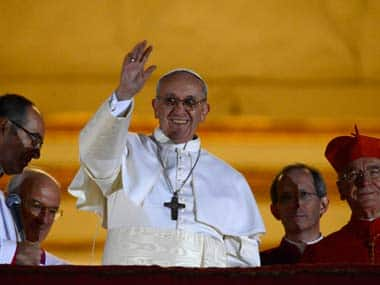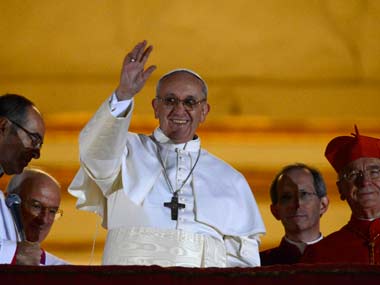Free market faithfuls like Jagdish Bhagwati will shake their heads. Inequality fighters like Amartya Sen will light incense sticks. Enterprise-friendly politicians like Narendra Modi will roll their eyes. Nanny-statists like Sonia Gandhi will kneel with delight. Across cultures and geographies, among leaders and policymakers, in universities and think tanks, the 224-page Apostolic Exhortation by Pope Francis is going to be read by the curious, critiqued by the entrenched, worshiped by those left behind.
In a 51,254-word document, Francis attempts to build a moral fibre for Christians, by offering a mix of religious values with economic introspection. While he addresses seven questions - reform of the Church in her missionary outreach; temptations faced by pastoral workers; the Church, understood as the entire People of God which evangelizes; the homily and its preparation; inclusion of the poor in society; peace and dialogue within society; and spiritual motivations for mission - it is his social and economic perspectives that will resonate louder. Addressing the contemporary challenges that people across rich and poor nations face, he uses rhetoric, labelling and common sense as tools to strengthen his message. To borrow a phrase from behavioural economics, Francis changes the frame, so we see a new reality.
[caption id=“attachment_1255399” align=“alignleft” width=“380”]  Pope Francis. Reuters[/caption]
“Just as the commandment ‘Thou shalt not kill’ sets a clear limit in order to safeguard the value of human life, today we also have to say ’thou shalt not’ to an economy of exclusion and inequality. Such an economy kills,” he says. “How can it be that it is not a news item when an elderly homeless person dies of exposure, but it is news when the stock market loses two points? This is a case of exclusion. Can we continue to stand by when food is thrown away while people are starving? This is a case of inequality. Today everything comes under the laws of competition and the survival of the fittest, where the powerful feed upon the powerless. As a consequence, masses of people find themselves excluded and marginalised: without work, without possibilities, without any means of escape.”
His language is soft but the message is unrelentingly critical, hugely emotional. If he were standing for elections in any country, including India, his ideas would engage hearts. “Human beings are themselves considered consumer goods to be used and then discarded,” he writes. “We have created a ‘disposable’ culture which is now spreading. It is no longer simply about exploitation and oppression, but something new. Exclusion ultimately has to do with what it means to be a part of the society in which we live; those excluded are no longer society’s underside or its fringes or its disenfranchised - they are no longer even a part of it. The excluded are not the ’exploited’ but the outcast, the ’leftovers’.”
Impact Shorts
More ShortsIt is when he gets technical that debate begins. “Some people continue to defend trickle-down theories which assume that economic growth, encouraged by a free market, will inevitably succeed in bringing about greater justice and inclusiveness in the world,” he says, while concluding that “This opinion, which has never been confirmed by the facts, expresses a crude and nave trust in the goodness of those wielding economic power and in the sacralised workings of the prevailing economic system. Meanwhile, the excluded are still waiting. To sustain a lifestyle which excludes others, or to sustain enthusiasm for that selfish ideal, a globalisation of indifference has developed. The culture of prosperity deadens us; we are thrilled if the market offers us something new to purchase; and in the meantime all those lives stunted for lack of opportunity seem a mere spectacle; they fail to move us.”
Is this true? In the Indian context, the answer is no and yes. When you see that there are 850 million people living on less than $2 a day, we can safely say that growth has not trickled down, that it has remained in the hands of the few, captured largely by the entrenched minority and partially by the middle-few industrious, who managed to breach the poverty trap through tools of education. While overseeing the work of CARE India in one of India’s poorest district in Bihar, I met an entire community of Musahars, called so because they are so poor that they eat mice to survive. At that point, all celebrations about the high growth of India that global investors were “betting” on collapsed for me. The new question I began to ask was: where is this growth, why is not visible, how can we tolerate such brutal inequality?
Amartya Sen analysed this question differently. “According to National Sample Survey data, average per capita expenditure in rural areas rose at the exceedingly low rate of about 1 percent per year between 1993-94 and 2009-10, and even in urban areas, average per capita expenditure grew only at 2 percent per year in this period,” he co-wrote with Jean Dreze in An Uncertain Glory. “While economic growth is an important tool for enhancing living conditions, its reach and impact depend greatly on what is done with the fruits of growth.” And then, there is the politics of subsidising powerful consumers - from cheap diesel to drive SUVs of the rich to implicit subsidies or revenue foregone on gold and diamonds . Forget trickle down, this is an open and legalised hijack of growth by economic incumbents.
Jagdish Bhagwati disagrees. Citing various studies and data, in a 3 December, 2010 speech in Parliament, he changed the frame with which to look at growth. “Growth was seen as what I have called an activist, radical ‘pull up’ strategy, not as a passive, conservative ’trickle down’ strategy, to reduce poverty. The growth strategy to pull the poor up from poverty, however, did not work because growth itself did not materialise because of the counterproductive policy framework that I sketched above.” He then goes on to illustrate how “it is now generally accepted that the enhanced growth over nearly 25 years year was associated with lifting nearly 200 million of the extreme poor above the poverty line.” The entire speech is laced with arguments that support growth, catch-phrased with ‘Revolution of Perceived Possibilities’.
While that debate rages on, Francis opens a new flank, by claiming causality between the unequal state of society and the psychological dominance of money over it. “The worship of the ancient golden calf has returned in a new and ruthless guise in the idolatry of money and the dictatorship of an impersonal economy lacking a truly human purpose,” he writes. “The worldwide crisis affecting finance and the economy lays bare their imbalances and, above all, their lack of real concern for human beings; man is reduced to one of his needs alone: consumption.” The growing inequality across the world, he says, “is the result of ideologies which defend the absolute autonomy of the marketplace and financial speculation. Consequently, they reject the right of states, charged with vigilance for the common good, to exercise any form of control. In this system, whatever is fragile, like the environment, is defenceless before the interests of a deified market.”
Francis is not the first Christian religious leader to come down on lust for money. “For the love of money is the root of all evil: which while some coveted after, they have erred from the faith, and pierced themselves through with many sorrows,” t he Bible states. Nor is the Bible the first text that analyses money. “Verily, there are many of the (Jewish) rabbis and the (Christian) monks who devour the wealth of mankind in falsehood, and hinder (them) from the Way of Allah. And those who hoard up gold and silver, and spend it not in the Way of Allah - announce unto them a painful torment,” says the Quran. “Wealth has its root in Virtue, and Pleasure is said to be the fruit of Wealth,” Bhishma, lying on a bed of arrows, told Yudhishthira in a discourse on statecraft following the great war. “Wealth destroys the foolish; but it cannot destroy those who seek the other shore. By his craving for wealth the fool destroys himself, as he would destroy others,” says the Dhammapada.
We must remember, however, that much as Francis bemoans the idea of inequality, Christian missionaries aided the subjugation, colonisation and plunder of Asia, Africa and South America barely a few hundred years ago, triggering the process. True, free markets have freed a lot of people across the world but they followed the spoils of slavery, aided by the Church. Traders and preachers joined hands in a saprophytic relationship that while expanding colonialism simultaneously fuelled missionary ambitions - the source driving both was the same. “Gold constitutes treasure, and anyone who has it can do whatever he likes in the world. With it he can succeed in bringing souls to Paradise,” wrote Christopher Columbus, quoted in Nayan Chanda’s brilliant book, Bound Together. “The Gospel must now be proclaimed to so many lands in such a short time.”
Of course, Francis can’t be expected to carry the cross of history. But reading between the lines, it seems he has got the spiritual sense of money - that it is a force that goes beyond cowries, coins and currency. Nobody has articulated the textures and tenors of this force better than Sri Aurobindo. “Money is the visible sign of a universal force, and this force in its manifestation on earth works on the vital and physical planes and is indispensable to the fullness of the outer life,” he wrote in chapter 4 of his 1927 masterpiece, The Mother. “In its origin and its true action it belongs to the Divine. But like other powers of the Divine it is delegated here and in the ignorance of the lower Nature can be usurped for the uses of the ego. The seekers or keepers of wealth are more often possessed rather than its possessors; few escape entirely a certain distorting influence stamped on it by its long seizure and perversion by the Asura.”
This perversion is accentuated in a poor country like India. If recent evidence is to be studied, the high economic growth has come with greater inequalities - despite a surfeit of welfare programmes. Even though the number of poor has fallen, wealth of the rich has risen faster. The resultant inequality gap has widened beyond compare, maybe even beyond repair. “All statistics show that the conditions of the poor are improving,” World Bank chief economist Kaushik Basu told me in his previous assignment as India’s Chief Economic Advisor. “But the top end income is increasing so much more rapidly that inequality is rising.”
Francis’s message needs to be read not for its economics, but for its morality, its greater social impact. “Every percentage point fall in economic growth reduces the number of new jobs created by 10 million,” a senior official told me last year. “If these young people remain unemployed, they become a key constituency of Maoist intrusions and ideology.” When Francis articulates a similar idea - “Until exclusion and inequality in society and between peoples is reversed, it will be impossible to eliminate violence” - we know that even as he sits on a high pedestal, he has his ear to the ground. And that’s why, irrespective of our religious leanings, our social stances, our economic ‘isms’, we need to give his ideas a patient, studied and open-minded hearing.


)

)
)
)
)
)
)
)
)



